|
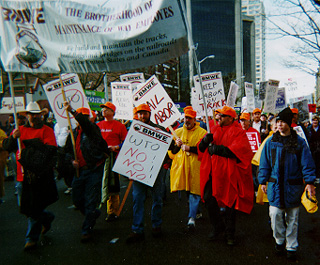
Under a large BMWE banner, more than 30 U.S. and Canadian BMWE
members from BN and UP Lodges 144, 159, 309, 389, 757, 1092, 1426 and
1734 as well as their families joined over 30,000 other trade
unionists from around the world marching through downtown Seattle on
Tuesday, November 30, 1999.
BMWE joined working people worldwide to demand "Fair Trade Not
Free Trade" and to protest the World Trade Organization's (WTO)
threat to our jobs, health and way of life. In solidarity, the
International Longshoremen's union shut down every port from Alaska to
San Diego on November 30. Seattle taxi drivers, though unorganized,
staged an impromptu wildcat strike in support of labor.
Trade unionists assembled in the rain beneath the space needle to
hear AFL-CIO President John Sweeney and others denounce the WTO, then
lead 30,000 people in "organized confusion" toward the WTO
meeting place downtown. Environmentalists, farmers, politicians and
religious leaders joined labor, peacefully laughing, joking, dripping
and occasionally sitting down in the street.
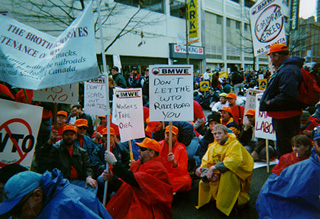
"Turtles and Teamsters -- United At Last." This
handwritten sign symbolized an unprecedented alliance among groups
which have often been at odds in recent history. Labor, enviros,
farmers, preachers--all had different primary concerns but all united
against the WTO's exaltation of multinational corporate power above
that of democratically elected national governments. Rank and filers
of various groups picked up a better understanding of and tolerance
for members of other anti-WTO groups as they marched, chanted and sang
together.
The WTO saw the alliance as a threat, but one prominent member
commented "So they got together for a walk. It won't last."
An apparent reference to management's perceived long-standing policy
of encouraging labor, environmentalists and farmers to fight among
themselves.
Senator "fast-paced Paul" Wellstone marched and spoke
everywhere. Wellstone compared the WTO to the railroad robber barons
of the 19th Century. Over 100 years ago,
protesters--including the BMWE--fought to civilize the national
economy with the eight-hour day, the RLA, the RRA, and health care. In
Seattle he said "we are here today--a broad coalition--to
civilize the global economy--to say the global economy has to work for
working families, work for the environment, work for the family farmer
and work for senior citizens."
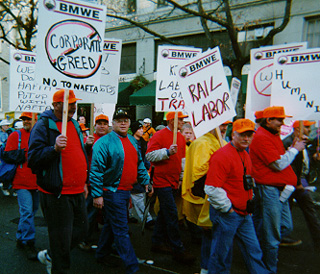
WTO at a Glance
The WTO was created in 1995 at the "Uruguay Round" of the
General Agreement on Tariffs and Trade (GATT), which has existed since
1946. Headquartered in Geneva, Switzerland, the WTO consists of 135
countries linked by trade-based, international treaties. Seattle was
WTO's first major meeting and the first meeting of trade ministers
away from a quiet, cloistered, secretive setting.
The WTO is, in effect, becoming a multinational, corporate-based
world government by creating a system where trade rulings can override
national, state, and local laws. WTO tribunals composed of appointed
(not elected) bureaucrats, meeting in secret with no input from labor
and with no appeal process, have ruled many democratically passed laws
effectively void as "barriers to trade."
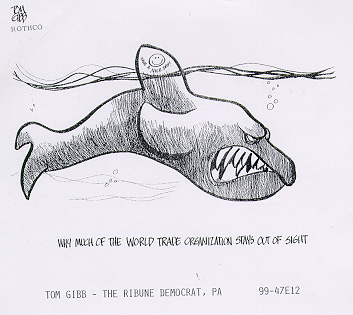
While WTO membership is nationally based, its decisions are
dominated by the needs and instructions of multinational corporations.
Labor, farmers, environmentalists, and citizens have no effective
voice. This means that the WTO strictly regulates intellectual
property and corporate patent rights, but has no standards for labor,
human rights or the environment.
In the WTO, nations become tools of the multinational corporations.
For example, the U.S. government went to bat for Chiquita Corp. at the
WTO, forcing several Central American countries not under contract to
Chiquita to stop growing bananas.
The WTO already voided U.S. laws that protect dolphins and sea
turtles from death in fishermen's nets and told the state of
Massachusetts it could not refuse to buy products made by slave labor
in Burma. Many more WTO cases are pending, including a challenge to a
French public health law banning import of asbestos which kills 2,000
each year.
What's in it for Us
Much of what makes our rail lives bearable and safe is rooted in
federal or state law. Our retirement, our wages, our right to work,
our health benefits--all of which we take for granted--all derive
directly or indirectly from the Railroad Retirement Act or the Railway
Labor Act. The following scenario is not too unreasonable.
Every railroad transports foreign-made goods and is thus involved
in world trade. Assume a major railroad--a multi-national
corporation--wants to stop paying federally mandated contributions to
railroad retirement. Management induces one of its client nations,
often one it has major financial holdings, to file a complaint with
WTO that the Railroad Retirement Act unreasonably raises the
transportation costs of foreign goods in the U.S. and is, therefore, a
"barrier to trade." The complaint is heard by an appointed
bureaucrat from a third WTO member nation, say Mynamar (Quick! Where's
Mynamar? What is Mynamar?), where retirement as we know it may or may
not exist.
Management's client nation presents its case to the tribunal in
secret. The U.S. reply, if any, is also secret. Neither the BMWE nor
any other labor organization can participate. The ruling of the third
party is final. It cannot be appealed. The WTO tribunal has the power
to effectively rule the Railroad Retirement Act null and void.
A similar process could be used to replace us. Management's client
state or a cheap labor country on its own initiative could file a
complaint with the WTO that BMWE's RLA-based out contracting rules and
U.S. immigration law are "barriers to trade" and therefore
void, freeing management to hand our work to the lowest bidder
worldwide.
Rail mergers could present rail management with opportunities to
use WTO tribunals to eliminate troublesome, unnecessary, bureaucratic
"barriers to trade" such as FRA safety rules, FELA, labor
protection, or even STB approval of the merger itself.
Still wonder why BMWE worries about the WTO? Or why you should
vote?
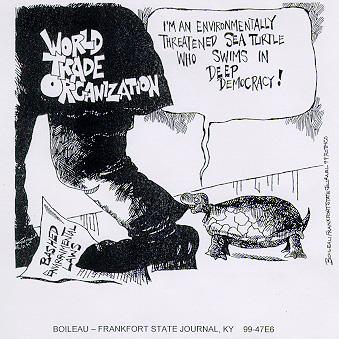
Gandhian Non-Violence
Developed by Mohandas Gandhi in South Africa and India in the early
1900s, non-violent passive resistance involves deliberate, public ,
pre-advertised violation of an unjust law, often involving taxes or
race-based restrictions, and using the resulting arrest and publicity
to emphasize the unfairness of that law in an effort to have it
changed. A variation of this strategy is deliberate, organized
violation of minor laws, such as traffic ordinances, to call public
attention to a perceived threat to the public good.
Both venues require informing local authorities of one's intent to
violate a legal code and the purpose of doing so. Gandhian principles
also mandate accepting legal punishment, however unjust, for the
deliberate violation. Gandhi spent years in jail to end British
colonial rule in India.
In the civil rights movement of the early 1960s, Rev. Martin Luther
King used passive resistance to undo segregation statutes. In the
early 1900s, a trade union, the Industrial Workers of the World, used
passive resistance to overturn state laws prohibiting union organizing
and criticizing one's own government.
In Seattle, some non-labor groups trained thousands of people in
Gandhian non-violent, passive resistance and announced their intention
to block streets months in advance of the WTO. Rather than simply
arrest and remove the protesters as was expected, Seattle police
reacted like Sheriff "Bull" Conner did in Alabama in
1963--with tear gas, clubs, grenades, bullets, and beatings of
protesters and Seattle citizenry. In the resulting fiasco, the media
focused on the graphics of opportunistic property damage by a very few
uncontrolled anarchists, local drug thugs and of a "well
organized police riot."
Thanks
BMWE, especially the members who participated in the Seattle march,
extends grateful thanks to the designated law firms of Bricker,
Zakovics and Querin; Ingebritson and Associations; and Stevenson and
Arnold, as well as Grand Lodge itself, all of whose financial and
logistic support made BMWE participation in the WTO protest possible.
|

